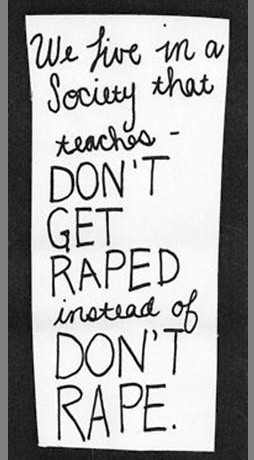Rape Culture
Rape culture is a term coined in the 1970s designed to show the ways in which society blames victims of sexual assault and normalizes male sexual violence. It allows us to live in a society where it is acceptable to teach sexualized violence prevention as “don’t get raped” instead of “don’t rape”.
 Emilie Buchwald, author of Transforming a Rape Culture, describes that when society normalizes sexualized violence, it accepts and creates rape culture. In her book she defines rape culture as a complex set of beliefs that encourage male sexual aggression and supports violence against women. It is a society where violence is seen as sexy and sexuality as violent. In a rape culture, women perceive a continuum of threatened violence that ranges from sexual remarks to sexual touching to rape itself. In a rape culture both men and women assume that sexual violence is a fact of life, inevitable. However, much of what we accept as inevitable is in fact the expression of values and attitudes that can change.
Emilie Buchwald, author of Transforming a Rape Culture, describes that when society normalizes sexualized violence, it accepts and creates rape culture. In her book she defines rape culture as a complex set of beliefs that encourage male sexual aggression and supports violence against women. It is a society where violence is seen as sexy and sexuality as violent. In a rape culture, women perceive a continuum of threatened violence that ranges from sexual remarks to sexual touching to rape itself. In a rape culture both men and women assume that sexual violence is a fact of life, inevitable. However, much of what we accept as inevitable is in fact the expression of values and attitudes that can change.
Rape culture includes jokes, TV, music, advertising, legal jargon, laws, words and imagery, that make violence against women and sexual coercion seem so normal that people believe that rape is inevitable. Rather than viewing the culture of rape as a problem to change, people in a rape culture think about the persistence of rape as “just the way things are.”
Rape culture is 1 in 6 women being sexually assaulted in their lifetimes. Rape culture is not even talking about the reality that many women are sexually assaulted multiple times in their lives. Rape culture is the way in which the constant threat of sexual assault affects women’s daily movements. Rape culture is telling girls and women to be careful about what you wear, how you wear it, how you carry yourself, where you walk, when you walk there, with whom you walk, whom you trust, what you do, where you do it, with whom you do it, what you drink, how much you drink, whether you make eye contact, if you’re alone, if you’re with a stranger, if you’re in a group, if you’re in a group of strangers, if it’s dark, if the area is unfamiliar, if you’re carrying something, how you carry it, what kind of shoes you’re wearing in case you have to run, what kind of purse you carry, what jewelry you wear, what time it is, what street it is, what environment it is, how many people you sleep with, what kind of people you sleep with, who your friends are, to whom you give your number, who’s around when the delivery guy comes, to get an apartment where you can see who’s at the door before they can see you, to check before you open the door to the delivery guy, to own a dog or a dog-sound-making machine, to get a roommate, to take self-defense, to always be alert always pay attention always watch your back always be aware of your surroundings and never let your guard down for a moment lest you be sexually assaulted and if you are and didn’t follow all the rules it’s your fault.
Rape culture is victim-blaming. Rape culture is a judge blaming a woman for her own rape. Rape culture is a minister blaming his child victims. Rape culture is accusing a child of enjoying being held hostage, raped, and tortured. Rape culture is spending enormous amounts of time finding any reason at all that a victim can be blamed for their own rape.
